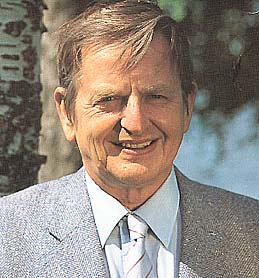
in full Sven Olof Joachim Palme prime minister of Sweden (1969–76, 1982–86), prominent leader of the Swedish Social Democratic Workers' Party (Sveriges Socialdemokratiska Arbetar Partiet), Sweden's oldest continuing party. He became Sweden's best-known international politician.
Born into a wealthy Stockholm family, Palme studied at Kenyon College, Ohio, U.S. (B.A., 1948), and obtained a law degree from Stockholm University in 1951. An active member of the Social Democrats from the early 1950s, Palme became Prime Minister Tage Erlander's personal secretary in 1953 and entered the Swedish Parliament in 1958. Palme joined the Social Democratic government in 1963 as minister without portfolio. In 1965 he advanced to the post of minister of communication and in 1967 to the dual post of minister of education and ecclesiastical affairs. He succeeded Erlander as party secretary and as prime minister in 1969. Soon afterward his attacks on U.S. war policy in Vietnam and his acceptance of U.S. Army deserters who sought refuge in Sweden led to strained relations between his country and the United States. (He denied the deserters official political refugee status, however, saying that one could not be a refugee from a free country.)
The 1976 general election resulted in the defeat of the Social Democrats after 44 years in power. Between terms in office Palme continued to be active in his party and maintained his strong pacifist stance. He also had close personal relations with European Social Democratic politicians such as Bruno Kreisky of Austria and Willy Brandt of West Germany. He served as president of the Nordic Council from 1979 to 1980, chaired the Independent Commission on Disarmament and Security in Geneva, and acted as UN special envoy to mediate in the war between Iran and Iraq.
The nuclear accident in 1979 at Three Mile Island in the United States had a great impact in Sweden, and Palme contributed to a referendum (passed in 1980) to remove all nuclear reactors in Sweden. After being elected prime minister again in 1982, Palme tried to reinstate socialist economic policies in Sweden, and he continued to be outspoken on matters of European security. He was assassinated by a gunman in 1986; his murder remains unsolved.

No comments:
Post a Comment